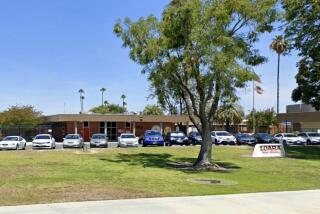Editorial: Disclosures cast new light on LAUSD’s probe of teacher Rafe Esquith
When famed teacher Rafe Esquith was yanked from his fifth-grade classroom and an investigation was opened into possible sexual and financial misconduct, parents in the Los Angeles Unified School District — and the larger education world — gasped. Esquith was as iconic as he was iconoclastic. A winner of the National Medal of Arts and Disney’s Outstanding Teacher of the Year award, he was known for breaking down traditional walls of elementary education, inspiring students to love and perform Shakespeare, and teaching, as he put it in one of his books, as though his hair were on fire.
The [Rafe] Esquith investigation was, by necessity, secretive; most of the public rhetoric came from Esquith’s lawyers.
Students, parents and pundits rallied to his side, bolstered by support from actor Ian McKellen, claiming that L.A. Unified administrators simply couldn’t stand the attention that such a great teacher attracted. The circumstances under which Esquith was suspended, and then fired, certainly raised questions. Could he really be in trouble for harmlessly joking that his class might have to perform nude to draw a crowd to its upcoming Shakespeare performance? For crying out loud, the joke was a literary reference to passage in Huckleberry Finn.
It didn’t help that L.A. Unified has had a recent history of abruptly suspending popular teachers over issues that didn’t affect instruction or student safety, then reinstalling them months later with no findings of wrongdoing. The Esquith investigation was, by necessity, secretive; most of the public rhetoric came from Esquith’s lawyers. As a result, news coverage often raised doubts about the district’s motives. One national education columnist called the investigation a “classic witch hunt.”
Or perhaps not. Recent documents released by the district provide a more off-putting glimpse of Esquith’s behavior. Some of his comments appear to be over-the-top remarks about nudity; others border on creepy, especially his emails to teenage girls, former students, referring to them as “hottie” or “sexy.” In one case, he continued to engage in sexualized banter even after a teenager’s reply evidenced her discomfort. In another case, he told a 14-year-old girl by email that “I spank really hard” and that “your bottom will hurt for months.” In a follow-up he wrote: “I’d love to see you tomorrow, and maybe even try that spanking!” Esquith’s attorneys say the quotes are taken out of context. That’s a possibility. Deprived of full information, the public continues to rely on hints instead of truth.
Still, those hints show that there was more to the district’s investigation than Esquith’s vocal supporters realized. Compliments to Supt. Ramon C. Cortines for stolidly going ahead with the inquiry, refusing to be cowed by protests and public opinion.
The Internet, especially social media, allows society to quickly disseminate facts — as well as half-truths and ardent if sometimes uninformed opinions. It speeds the rush to judgment. Today, it’s still not entirely clear — because the evidence is not all available — whether the district was right to fire Esquith, but there were obviously enough disturbing findings to have justified the investigation. When protecting children, only the facts and a calm, deliberative process must prevail, not hasty assumptions based on what people wish were true.
Follow the Opinion section on Twitter @latimesopinion and Facebook.
More to Read
A cure for the common opinion
Get thought-provoking perspectives with our weekly newsletter.
You may occasionally receive promotional content from the Los Angeles Times.










